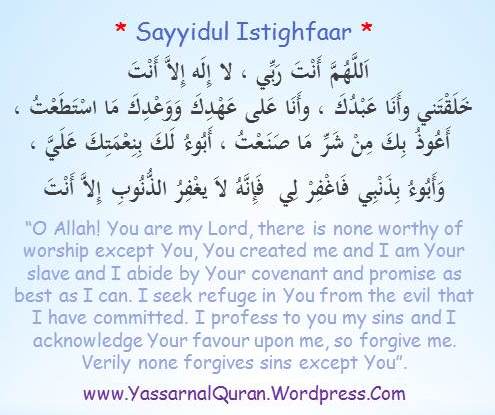Sayyidul Istighfaar
Bismillahir Rahmaanir Raheem.
Dear sisters and brothers, Assalamu Alaikum.
The du’aa (supplication) which is very popular in the name of Sayyidul Istighfaar is this:

This du’aa is taken from the following hadeeth:
On the authority of Shaddad bin Aws (May Allah be pleased with him) that the Messenger of Allah, Peace be upon him, said:
“Indeed the major supplication for forgiveness is:
“O Allah! You are my Lord, there is none worthy of worship in truth except You, You created me and I am Your slave and I abide by Your covenant and promise as best as I can. I seek refuge in You from the evil that I have committed. I acknowledge Your favour upon me, and I profess all my sinse to You, so forgive me. Verily no one can forgive sins except You”.
“So whoever says this with certainty when the morning arrives and dies during that day before evening, then he is from the people of Paradise and whoever says it with certainty in the evening, and dies before the morning, then he is from the people of Paradise.”
(Narrated by Bukhari, an-Nisa’ee & Tirmidhi)
In`al-Majmoo’ al-`Aleeyah min Kutub wa Rasail wa Fatawa, Shakyh ul-Islam Ibn Taymiyyah gives the following explanation to the aforesaid hadeeth:
“Regarding the saying of the Messenger of Allah (peace be upon him) about the Leading Supplication for Seeking Forgiveness is that when the slave of Allah says: ‘O Allah You are my Lord, there is none worthy of worship in truth except You’ this hadeeth comprises well-known, magnificent matters and therefore it is rightfully the Leading Supplication for Seeking Forgiveness since it commences with the slave of Allah acknowledging al-Ruboobiyah (The Lordship) of Allah.
Then the slave of Allah follows that up with Tawheed al-Uloohiyah (Allaah’s sole right to be Worshipped) by saying: ‘there is none worthy of worship in truth except You.’ So here he acknowledges that it is Allaah who created him and brought him into existence when he was nothing and so Allah is rightfully The One who takes charge of complete beneficence to His slave with forgiveness for his sins, just as He — Subhanahu wa Ta’aala — began with beneficence to him by creating him.
The slave of Allah then says: `I am Your slave’ by which he acknowledges that servitude of worship is only for Allaah, since Allaah —Ta’ala- created the son of Adam for Himself and for His worship as is mentioned in some Athaar (narrations).
So, if a slave of Allah leaves that for which Allah created him, which is obedience to Allaah, knowing Him, loving Him, turning repentantly to Him and relying upon Him, then he has fled from his Master.
When the slave of Allah repents to Allaah and returns to Him, then he has repented to that which Allaah loves from the slave and so Allaah is pleased with this return. This is why the Messenger -sallAllaahu alayhi wa sal lam-mentioned regarding Allaah Ta’ala that: `Allaah is greater in happiness with the repentance of His slave than that of a slave finding his lost ride, which had his food and his drink on it, in a perilous land after he had given up hope of recovering it.’ Allaah — Subhanahu — is The One who is capable of returning his ride and Allaah was The One who returned it to him. This is the height of excellence and beneficence, worthy of he who is in this circumstance, and there is nothing more beloved to the slave than Allaah.
The slave of Allaah then says: `and I abide by Your covenant andpromise as best as I can’. So Allaah — Subhanahu wa Ta’ala — made a contract with His slaves wherein He set out commands and prohibitions. Allaah promised them that if they fulfilled His contract, He would reward them with the highest of rewards. So the slave of Allaah continues moving between fulfilling his contract to Allaah and attesting to Allaah’s promise, meaning: I fulfil Your contract, attesting to Your promise.
This meaning was mentioned by the Prophet -sallAllaahu alayhi wa sallam- in his saying: `Whoever fasts Ramadan with Eemaan and (al-Ihtisaab) hoping for a reward, then he is forgiven for his previous sins.’
Eemaan here is the action which is: the contract Allaah contracted with His worshippers.
Al-Ihtisaab (hoping for a reward) is: hoping for Allaah’s reward by doing this action – which is not fitting except when attesting to His promise.
As for his -sallAllaahu ala~hi wa sallam- saying: ‘Eemaan and Al-Ihtisaab (hoping for a reward)’ then the slave of Allaah is driven to do this, due to his Eemaan. Allaah legislated and obligated it, was pleased with and commanded it. Al-Ihtisaab (hoping) is the reward with Allaah which means the slave of Allaah does this action sincerely for Allaah, hoping for His reward.
As for his saying: ‘as best as I can’, then this means: I fulfil this according to my ability and that which Allaah has made rightful upon me, not according to that which befits You 0 Allaah.
In this statement there is a proof which establishes that the slave of Allaah has strength and capability and that he is not compelled by destiny, rather he himself has the capability which is his being entrusted with commands and prohibitions, reward and punishment.
Also from this statement is a refutation of the Qadareeyah al-Muj birah (a sect who believe that destiny means that actions are due to compulsion); who say that the slave of Allaah has neither capability nor potential by himself and that he has no decision over actions whatsoever, but rather that Allaah will punish due to Allaah’s own action and not due to the action of Allaah’s slave.
This part of the supplication is also a refutation of the al-Majooseeyah (fire worshippers).
Then the slave of Allaah says: ‘I seek refuge in You from the evil that I have committed’ so the slave of Allaah seeks refuge, protection and fortification with Allaah, fleeing to Him from that which one seeks refuge from, just like the refugee who secures himself from the enemy in a fortress which will save him from them.
There is affirmation of the actions of the slave of Allaah and his seeking his own livelihood and also that evil is attributed to his own actions and not to his Lord in his saying: ‘I seek refuge in You from the evil that I have committed’ so evil, in itself, is indeed from the slave of Allaah.
As for our Lord (Allaah) that He has Beautiful Names, all His Attributes are attributes of perfection and all His Actions are Wise and for a just purpose. What supports this is the saying of the Messenger, peace be upon him: ‘evil is not attributed to You’ as is mentioned in the hadeeth narrated by Muslim in the supplication for beginning the prayer.
The slave of Allaah then says: ‘I acknowledge Your favour upon me’ which means I acknowledge this matter; i.e. I affirm this – that I acknowledge You with Your blessings upon me. You are The One deserving of this because You are The One who is praised and I seek forgiveness from You for my sins. This is why some of the righteous people said: ‘It is a must that every breath the slave of Allaah takes is one of two types; one breath where he praises his Lord and, in the next one, one where he seeks forgiveness from his sins.’
When the slave of Allaah testifies to these two matters then his Uboodiyah (servitude to Allaah) becomes correct, he is raised in degrees of goodness and Eemaan, his own self is diminished and he humbles himself for his Lord. This is the perfection of Uboodiyah by which he becomes free of being amazed by himself, of pride and of beautifying actions in order to show off.
Allaah is The One who gives success and He is The One Who Guides.
All praise be to Allaah Alone and may the peace and blessings of Allaah be upon our leader Muhammad, his Family and his Companions, may Allaah be pleased with them all. Allaah is sufficient for us and He is The Best to protect.’
You can download the above explanation of Shaykh al Islam Ibn Taymiyyah from here
May Allah give us the hidayah to seek forgiveness every morning and evening so that if we die in the mid way, as per the hadeeth quoted above, we will be accounted among the dwellers of Jannah, Insha’Allah.
PS: ‘The Most Excellent Manner of Seeking Forgiveness’ by Shaikh Abdur-Razzaaq ibn Abdul-Muhsin al-Abbaad is uploaded here
Sharing will fetch You high rewards from the Lord of the worlds, InShaaAllah...
Related
January 16, 2012 -
Posted by MuQeet |
Sayyidul Istighfar | Al Afuww, Al Ghaffaar, Al Ghafoor, Allah is Forgiving, Forgiveness, Hadith, Ibn Taymiyyah, Repentance, Repentence, Sayyidul Istighfar, Seeking Forgiveness, Tawbah, Way to seek forgiveness in Islam, Yassarnalquran













may allah blessthem who put istagfar translation and explain all that
Comment by noor | January 18, 2013 |
Jazakallahu Khayr for that beautiful du’aa.
Comment by MuQeet | January 18, 2013 |
[…] Please make sure that you often include SAYYIDUL ISTIGHFAAR in your du’aas. This du’aa i… […]
Pingback by Golden Moments are here! « YasSarNal QuR'aN | July 30, 2013 |
Reblogged this on YasSarNal QuR'aN and commented:
Please learn this du’aa Inshaa’Allah (if you still do not know)
Jazakallaahu Khayra.
Comment by MuQeet | July 30, 2013 |
Reblogged this on Voice of an Outspoken Hijabi and commented:
May Allah forgive all those who spread Khayr. Aameen.
Comment by OutspokenHijabi | July 30, 2013 |
Jazakallaahu Khayra for the beautiful du’aa and thank you for reblogging.
Comment by MuQeet | July 30, 2013 |
[…] Recite Sayyidul Istighfaar with firmness of belief every morning and […]
Pingback by Eleven Things A Muslim Should Try To Do Daily « YasSarNal QuR'aN | June 30, 2014 |
[…] Related links: Sayyidul Istighfaar […]
Pingback by Activity Schedule for the First 13 Days of Dhul Hijjah | |-| Islamic Studies |-| | September 1, 2016 |
[…] ✅ Think of memorizing a Surah or at least a few verses like, for example: Ayatul Kursi (if u know already, learn its meaning) Last 2 verses of Surah al Baqarah (If you know already, learn its meanings) Last 3 verses of Surah al Hashr Last 2 verses of Surah Tawbah Verses 26 and 27 of Surah Aal Imran Surah al Mulk Sayyidul Istighfaar. https://yassarnalquran.wordpress.com/2012/01/16/sayyidul-istighfaar/#more-1741 […]
Pingback by How to Spend the Last 10 Nights of Ramadhaan | |-| Islamic Studies |-| | April 11, 2023 |